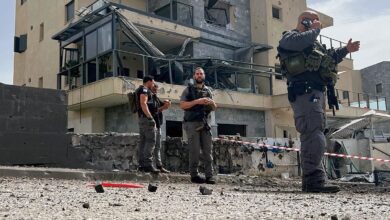“We are near”: US President Joe Biden anticipates a cease-fire as Israel and Hamas engage in negotiations in Qatar
Speaking at talks in Qatar that also sought to mediate the release of captives, US President Joe Biden expressed his hope that a truce in the Israel-Hamas conflict in Gaza would begin by next Monday. Both parties’ attendance for “proximity talks,” which include meeting separately but in the same location with mediators, indicated that discussions were moving more quickly than they had since a major push at the beginning of February when Israel turned down a counteroffer from Hamas for a four and a half-month ceasefire.

Biden expressed his hope that a truce will begin in a few days. He said, “Well, I hope by the beginning of the weekend, by the end of the weekend,” when asked when he thought the truce would begin. We’re near, my national security advisor assures me. We are near. We have not yet finished. “I’m hoping that by Monday of next week, there will be a cease-fire,” Biden said to reporters while in New York.
According to a US source, senior US officials were working on the matter last week as US negotiators made a concerted effort to reach a pause-for-hostages agreement before Ramadan’s start on March 10. According to the source, the optimism seemed to stem from talks between Qataris and Israelis. Both Israel and Hamas continued to publicly hold diametrically opposed views on a potential ceasefire and blame one another for any delays.
Ismail Haniyeh, the reclusive leader of Hamas, said that his organization had welcomed attempts to put an end to the conflict and accused Israel of procrastinating while Gazans perished under blockade after meeting with Qatari Emir Sheikh Tamim bin Hamad Al Thani. “We will not allow the enemy to use negotiations as a cover for this crime,” he said.
Benjamin Netanyahu, the prime minister of Israel, said that his country was open to a negotiation and that Hamas should give up on demands that he called “from another planet.”
Of course, if we can get this arrangement, that’s what we want. Depending on Hamas, yes. They really have the last say now,” he said to Fox News in the US. “They have to come down to reality.”
Al Thani’s office said that the chairman of Hamas and Al Thani had spoken about Qatar’s attempts to negotiate a “immediate and permanent ceasefire agreement in the Gaza Strip.” An Israeli working party has traveled to Qatar to establish an operational center to facilitate discussions, a source previously told Reuters. The source said that part of its task would be to screen potential Palestinian militants that Hamas wants to be released as part of a hostage-release agreement.
While Hamas claims it would not release captives in the absence of a deal to end the war, Israel publicly maintains that it will not stop the conflict until Hamas is destroyed. Israel’s minister of industry and finance, Nir Barkat, told Reuters, “We’re totally committed to wipe Hamas off the face of the Earth,” during a conference in the United Arab Emirates. Barkat’s attendance signaled that Arab governments continue to recognize Israel, which has infuriated Palestinian militants.
According to senior Hamas official Sami Abu Zuhri, any ceasefire deal would need to include “securing an end to the aggression, the withdrawal of the occupation, the returning of the displaced, the entry of aid, shelter equipment, and rebuilding.” This was said to Reuters on Monday.
The United States, Israel’s principal ally, is pressuring Israel to quickly reach a ceasefire in order to prevent an impending attack on Rafah, the southern Gaza city where more than half of the 2.3 million residents of the enclave are seeking refuge, which Washington believes might turn into a carnage.
“WE’LL GO IN.” Netanyahu said that Israel had a strategy to remove people from danger and that an attack on Rafah remained planned. Netanyahu said, “Well, we’ll go in,” when asked whether Israel would strike even if Washington ordered it not to. Naturally, we make our own judgments, but we’ll proceed with the understanding that the civilian evacuation will also take place.”
Since Friday, when Israeli officials discussed the conditions of a prisoner release agreement in Paris with representatives from the US, Egypt, and Qatar—but not Hamas—the impetus behind the discussions seems to have increased.
Israel began an all-out ground assault on Gaza on October 7, after Hamas murdered 1,200 people and took 253 prisoners. Nearly 30,000 people have been verified died as a result of this operation, according to Gaza health officials.
The Palestinian Authority, which has limited civil authority over certain areas of the West Bank, lost its prime minister on Monday, a move that may affect longer-term discussions. In order to facilitate the development of a wide agreement among Palestinians over political arrangements in the wake of the Gaza war, Mohammad Shtayyeh announced his resignation.
In 2007, Hamas gained control of Gaza when the PA, which was acknowledged by the West as the legitimate representation of Palestinians, lost it. As part of a comprehensive plan to administer Palestinian territory, including Gaza, after the conflict, Washington has asked for changes to the PA.







